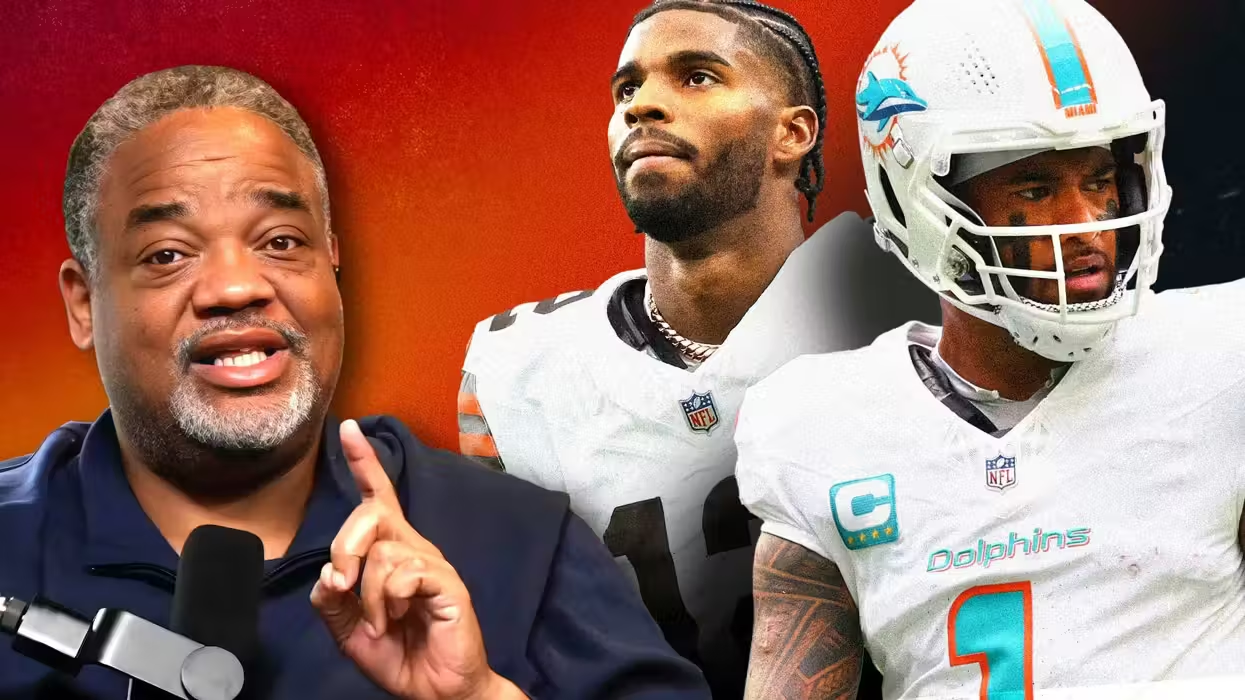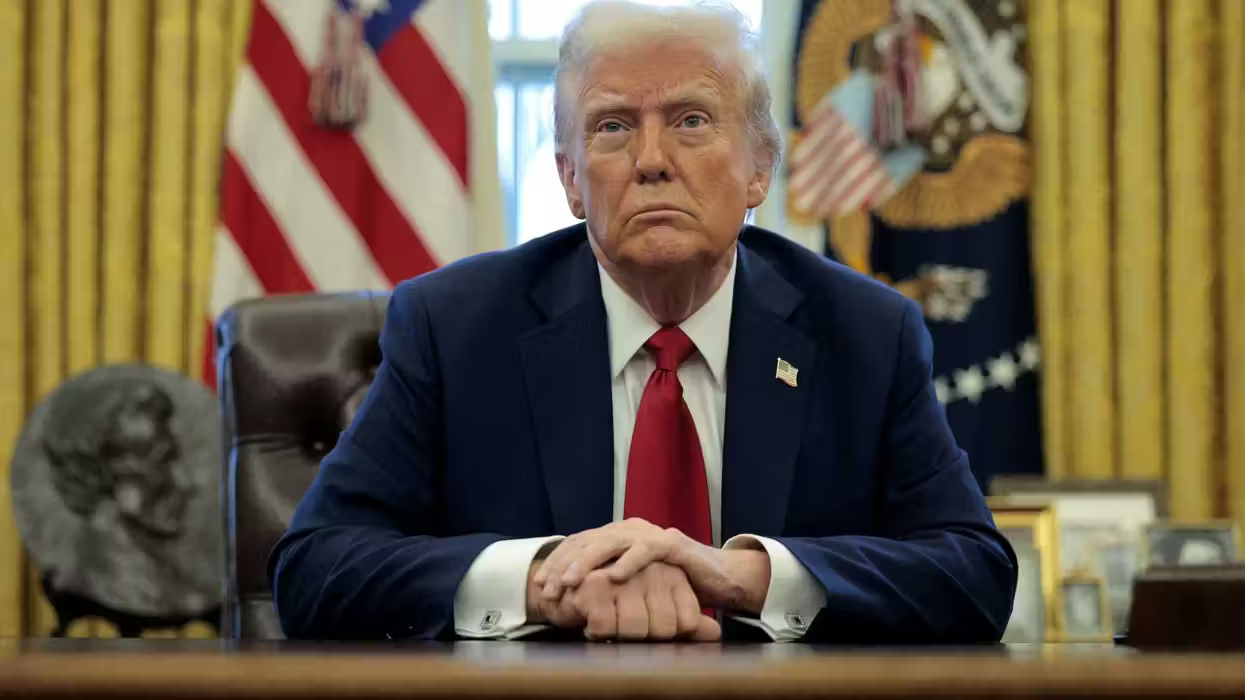
© 2025 Blaze Media LLC. All rights reserved.
I am opposed to tariffs as a rule and believe them to be an antiquated device from a bygone era — before we had a global economy; before countries like China could effectively become our landlord. And back when most of our everyday goods were manufactured here, not overseas for cheaper than they can be manufactured here now, and thus are cheaper for the American consumer to buy.
Because of this economic evolution, tariffs are now more of a tax on our own people than a weapon to leverage others. Just as American companies pass on as much of their tax burden to American consumers as the marketplace will bear, so will foreign countries we go to trade war with.
However, I’m also not a proponent of what “free trade” has become: We assume the position for everyone else, and they get to take full advantage. I have for years criticized how NAFTA has devolved into “Mexico gets to ship millions of its people here, while we send thousands of American jobs there.”
Though he has undoubtedly benefitted greatly from global partnerships, Donald Trump has ironically become a voice for the American worker caught in this heads-they-win, tails-we-lose proposition I just laid out. And it’s one of the main reasons he’s president of the United States today. One of the methods the president intends to use to keep his campaign promises to the American worker is reintroducing tariffs, which he believes will level the playing field, much to the chagrin of many conservatives.
My home state of Iowa is at the epicenter of this debate. Though he campaigned on tariffs, Trump became the first Republican since Ronald Reagan to win Iowa with more than 50 percent of the popular vote. However, that hasn’t stopped Iowa’s GOP politicians from expressing their concerns about Trump following through on that campaign promise. They believe Iowa’s prominence as an agricultural state, which relies heavily on exports, makes it a likely target of return fire from countries like China. Governor Kim Reynolds said Iowa’s agricultural economy could be “the first casualty” in a trade war, and Senator Charles Grassley added that “this is a nervous situation for farmers.”
To get some clarification on what Trump’s tariffs could mean to a key battleground state like Iowa, and rural America in general, I went to a friend of mine, David VanderGriend, CEO of ICM, one of the global leaders in renewable fuels. He’s also a hard-core conservative, going so far as to endorse Ted Cruz in the 2016 Iowa caucuses over the objections of many of his industry peers. VanderGriend’s expertise, success, and willingness to go against the grain make him an ideal source to get a better grasp on what’s become a contentious issue.
What is your overall view of tariffs as a general practice?
VG: I’m a conservative. I believe in free markets and capitalism. I’d like to see renewable fuels capitalize on the chance to compete straight-up on the free market. But there’s a big picture at stake here that is often ignored in this debate: Not all of our global trading partners believe in free markets.
For example, it’s hard to have free markets and free trade with a country that pays its workers substantially less than we do here in the U.S. How do we have free markets and free trade with countries who treat their people poorly by comparison? That has proven to be a job-killer, and without some parity, jobs will continue to exit this country as they have the last several decades.
China is a good example of cheap labor producing consumable products to be marketed cheaply here in the U.S. On the other hand, they tariff our ag products because their production cost is well above ours. Corn and distiller grains have been targeted with quotas and then tariffs for many years now. Renewable fuels are also tariffed, because we can produce it and ship to China cheaper than they can produce it there. So, again, in an ideal situation I’d love it if we could all just compete straight up and may the best man capitalize. But that’s not happening, and though tariffs aren’t an ideal solution, this is a conversation long overdue.
Don't miss a minute of Steve Deace on CRTV! Sign up for your FREE 30-day trial today!
What do you think President Trump believes he’s trying to accomplish using tariffs, and how is that different from what you believe will be the actual results?
VG: Trump wants fair trade, and China obviously does not. Thus, what we know for sure is they will respond to our tariffs with making their goods more expensive for U.S. consumers to buy.
Should the president follow through on his threatened $500 billion blanket tariff on imported Chinese goods, how would that impact rural America and consumers across the country?
VG: A blanket tariff would cost all Americans when they go to buy [expensive] in-demand items like flat screens and cell phones, but could potentially make domestic-produced goods more competitive. At least that’s the president’s hope as he tries to take the first shot to improve what have been pathetic trade negotiations under past administrations. Here’s what’s at stake with this gambit: Though farmers are just five percent of our population, we represent the majority of our exported goods. And many of those rural American voters went with Trump in the last election on his promise to address and fix this issue.
On a scale of 1-10, with one being the least and 10 being the most, how worried is the agricultural industry about these tariffs and why?
VG: I would say a five, depending on your perspective. A lot of farmers are focused more on the price at the elevator today compared to what it could be next year. Otherwise, we would’ve been demanding our politicians address this competitive disadvantage years ago. Trump is gambling that in the short term, Americans are more willing to pay a little more for a flat screen than other countries are willing to pay more for food. And that these tariffs will leverage a better long-term deal for rural America.
For instance, China desperately needs to buy corn and soybeans on the world market, and the U.S. basically is the world market for such commodities. Will it work out that way? I don’t know, and it’s up to Trump to prove art of the deal is more than just the name of a book. Again, I wish it didn’t come to this. I’m a conservative and I believe in free markets. But I also know firsthand that the president was right about the status quo of our trade policy being a bad deal for the American people all around.
Want to leave a tip?
We answer to you. Help keep our content free of advertisers and big tech censorship by leaving a tip today.
Want to join the conversation?
Already a subscriber?
BlazeTV Host
Steve Deace is the host of the “Steve Deace Show” and a columnist for Blaze News.
SteveDeaceShow
Steve Deace
BlazeTV Host
Steve Deace is the host of the “Steve Deace Show” and a columnist for Blaze News.
@SteveDeaceShow →more stories
Sign up for the Blaze newsletter
By signing up, you agree to our Privacy Policy and Terms of Use, and agree to receive content that may sometimes include advertisements. You may opt out at any time.
Related Content
© 2025 Blaze Media LLC. All rights reserved.
Get the stories that matter most delivered directly to your inbox.
By signing up, you agree to our Privacy Policy and Terms of Use, and agree to receive content that may sometimes include advertisements. You may opt out at any time.






